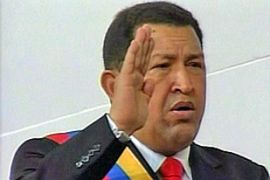Chavez decrees 26 new laws
Venezuela’s president makes changes to business sector as special powers end.

The decrees met with opposition from Fedecamaras, the Venezuelan federation of chambers of commerce.
Jose Manuel Gonzalez, a business chamber leader of Fedecamaras, said: “We ask the president: Why does he fear democracy?”
He said that the package of laws included socialist concepts that voters rejected last year as part of a proposed overhaul of Venezuela’s constitution.
“We are sure that this is nothing more than imposing the reform project that was rejected in December,” Gonzalez said.
Ramon Carrizalez, the country’s vice president, denied it.
“There are things that can be done without the necessity of reforming the constitution,” he said.
Optimum control
Chavez said the new laws would fight speculation and provide optimum control of products, with the greater participation of producers.
Under one of the new laws, food retailers or distributors caught skirting government-imposed price controls or hoarding products would be punished with up to six years in prison.
Business owners who refuse to produce, import, transport or sell “items of basic necessity” would face up to 10 years in jail.
The decree also allows the government to “restrict or prohibit the import, export, distribution, exchange or sale” of certain foods or agricultural products and “take over distribution activities when considered necessary”.
Other measures increase state control over commerce, services and publicity. Businesses that violate the new rules could face fines or indefinite closure.
On Friday, Chavez announced plans to nationalise Banco de Venezuela, a private bank belonging to Spain’s Grupo Santander.
‘State-run system’
Jorge Botti, an economist who heads a Fedecamaras committee studying the impact of government policy on the private sector, said: “The government believes it can advance toward a centralised, state-run economic system, but that’s going to cause more conflict with the business community”.
Chavez’s push towards “21st century socialism” has been criticised by business leaders and opposition politicians, but many of his policies aimed at using oil wealth to help the poorer sections of society have been welcomed by the those who have benefitted.
The decree creating a new National Bolivarian Militia – a branch of the military consisting of civilian volunteers who will help neighborhood-based communal councils establish “defence committees” – also came in for criticism.
Fernando Ochoa, a former defence minister, said that the groups could closely resemble Cuba’s Committees for the Defence of the Revolution, which encourage citizens to watch for “counterrevolutionary” activities.
The communal councils were set up by Chavez in an effort to encourage the involvement of Venezuela’s poorer communities in participatory democracy. They oversee policies and projects working towards community development.